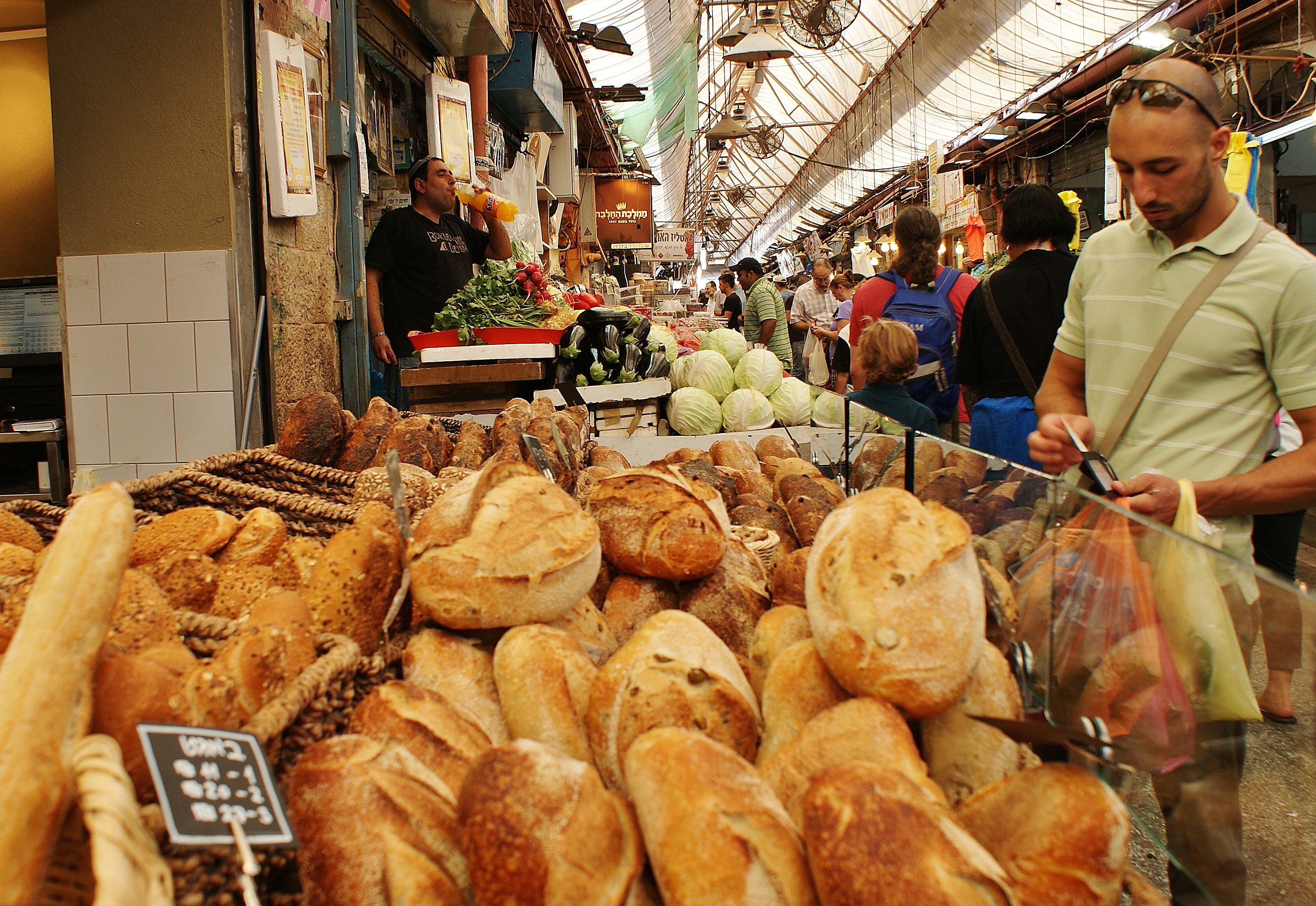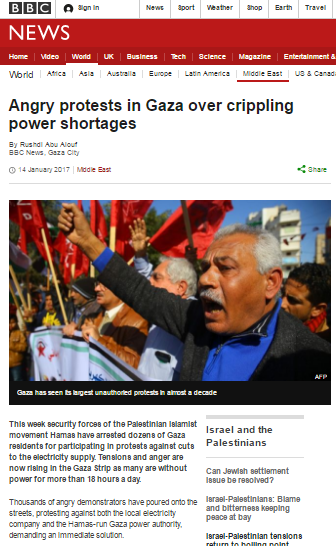Episode six of Jeremy Bowen’s 25-part BBC Radio 4 series ‘Our Man in the Middle East’ was broadcast on May 22nd. Titled ‘Crossing the Divide’, the programme begins with a tale highlighting Bowen’s unfamiliarity with the subject of gas fittings before moving on to broader subject matter.
Bowen: “It felt like every part of life was touched by the conflict; it was exhausting. It might have been more fun to live in Tel Aviv, which feels like another country. It’s a hedonistic, mainly secular city on a Mediterranean beach. In the winter I’ve scraped the ice off the car in Jerusalem to find an hour later in Tel Aviv that people are strolling in shirt sleeves in the sun. Sometimes Israelis who live there say they’re in a bubble that lets them forget the conflict. Jerusalem was the opposite: everything was infected by the conflict. And, whenever I drove past Ben Gurion airport I fantasized about catching a plane home.” [emphasis added]
Tel Aviv is of course far from immune to terror attacks and that was also the case immediately before and during the period of time in which Bowen was stationed in Israel (1995–2000). He goes on:
Bowen: “The peace process was collapsing after the assassination of Israel’s Prime Minister Yizhak Rabin. It was all bad news – but that’s what journalists like.”
Listeners then hear undated, context-free snippets from some of Bowen’s past reports, including the claim that in Hebron, “Jewish settlement still takes up one fifth of the town” without any clarification regarding the relevant Hebron Protocol. Bowen continues:
Bowen: “I read more, spoke to more people and started to understand why life could be so difficult. As for Jerusalem – my adopted home – the city had been desired and venerated for 3,000 years by a procession of dynasties and peoples. Struggle and conflict were normal. It took two or three years but to my surprise Israel, the occupied Palestinian territories and Jerusalem – especially Jerusalem – started pulling me in. […]
Even the food tasted of the ethnic tangle. Not just the old Israeli and Palestinian argument about who invented falafel and hummus. I learned about the heritage of Jews who’d emigrated to Israel from North Africa, Yemen and Iraq by eating their food, usually in the raucous streets around West Jerusalem’s main market; Mahane Yehuda. These days its edges have been blurred by gentrification and the fact that food has become fashionable.”

As he did with Tel Aviv, Bowen erases the topic of the terror attacks on Mahane Yehuda market during that time period from his account. His rare mention of Jewish refugees from Arab lands (which he fails to identify as such) continues:
Bowen: “[…] But in the 1990s Mahane Yehuda was a noisy, teeming symbol of the ethnic divide between Israeli Jews. Brown-skinned Mizrahis from the Middle East and North Africa who felt excluded by European Jews – the pale-faced Ashkenazis from Poland, Russia and Germany who created the Israeli state and often behaved as if they owned it.”
Bowen then gives a potted history rife with deliberate omission of relevant context. Failing to tell listeners of the pogroms that prompted the First Aliyah, erasing the arrival of Jews from Yemen in the same period and refraining from clarifying the significance of the particular area to the Jewish people, he says:
Bowen: “European Jews started emigrating from Russia in 1882. An Austrian journalist Theodor Herzl pioneered the idea of Zionism – creating a state for the Jews – and organized the first Zionist congress in 1897. The Zionists wanted Palestine but Arabs already lived there. In the end, Jewish immigrants from Europe outmanoeuvred and out-fought Palestinian Arabs and built a state in waiting.” [emphasis added]
In other words, Bowen recycles his long promoted theme of ‘European’ Jews taking over ‘Arab land’, erasing from audience view the existing Jewish communities in Jerusalem, Hebron, Tsfat and elsewhere. Failing to explain why the British were in Palestine and with no mention of the League of Nations Mandate for Palestine he goes on:
Bowen: “At the end of the Second World War the bankrupt and exhausted British were reduced to holding the ring as Arabs and Jews fought a civil war.” [emphasis added]
Bowen’s use of the phrase ‘holding the ring’ inaccurately implies to listeners that the British Mandate authorities were not involved in the conflict despite actions such as restrictions on Jewish immigration both before and after the war. As the BBC’s own profile of the Arab League states, the creation of that body was “mooted in 1942 by the British” and its agenda was primarily devoted to “preventing the Jewish community in Palestine from creating a Jewish state”.
After a BBC archive recording from March 1948, Bowen continues:
Bowen: “Britain turned the problem over to the United Nations. The UN voted to partition Palestine into two states with Jerusalem under international control. The Jews agreed, the Arabs did not. As the British left in the summer of 1948, David Ben Gurion read Israel’s declaration of independence.”
He fails to clarify that the Partition Plan limited the period of international control over Jerusalem to ten years, why the Arab nations rejected it or that the Arab refusal to accept the recommendations of UN GA resolution 181 meant that it became irrelevant. The latter omission enables him to go on to inaccurately tell BBC audiences that Israel acquired land to which it was not entitled.
Bowen: “Ben Gurion became Israel’s first prime minister. The neighbouring Arab states invaded to try to strangle the new Israel at birth. They failed. Israel, victorious, took much more territory than the UN had given it. Palestinians use the Arabic word ‘naqba’ which means catastrophe to describe what happened to them in 1948. Up to 760,000 Palestinians fled or were expelled. Their descendants are still refugees.” [emphasis added]
Bowen of course does not tell listeners that Palestinians pass on refugee status to their descendants or that the Arab nations have for 69 years deliberately ensured that they are “still refugees”.
Failing to explain why the Six Day War happened or to mention subsequent Israeli withdrawals from Sinai and the Gaza Strip, he continues:
Bowen: “Another war came in 1967 which created the current shape of the conflict. In six days Israel added the West Bank, including East Jerusalem, Gaza and the Golan Heights. From the beginning Israelis set about building a new country and made sure every part of government did its bit, including the town planners.”
Listeners then hear a recording of undated archive report by Bowen:
Bowen: “It’s very hard for Palestinians in Jerusalem to get permission to build. A lot of their houses have been demolished recently. Most building permits here are issued to Jews. Yasser Arafat believes that Israel is trying to squeeze Palestinians out of Jerusalem. At the Palestinian legislature today he said that he’d lost patience with Israel. Palestinians, he said, had to defend their rights in Jerusalem with all means. Building more homes for Jews in the desert to the east is part of Israel’s latest scheme to strengthen its grip on Jerusalem. This is land captured by Israel in 1967. Its future was supposed to be negotiated with the Palestinians.”
Bowen fails to clarify to listeners that the final status negotiations stipulated in the Oslo Accords never came about because Arafat chose instead to launch the Second Intifada terror war.
Bowen: “Meron Benvenisti was the Israeli deputy mayor and chief planning officer of Jerusalem during much of the 1970s. Twenty years later he stood with me on the Mount of Olives; the hill that overlooks the Old City.”
Benvenisti: “Each housing project fits into a strategic plan. It’s not the planners who are planning Jerusalem; it’s the politicians who are planning Jerusalem. The politicians are planning Jerusalem as generals who are planning a battlefield.”
Bowen: “Benvenisti explained how roads could be as much about nation building as traffic. That extended to the occupied territories, he said. Israel girded Jerusalem with roads as it sliced up the West Bank which Palestinians want for a state. Many are political highways, aimed at controlling Palestinians, safeguarding Jewish settlers and strengthening the occupation. ‘You know’, Benvenisti said, ‘we’ve spent millions and used all the energy of the state to try to make this city more Jewish. But despite all that, the ratio of Jews to Arabs in Jerusalem is the same as it was in 1967. They make more babies than we do’. Demography is politics here too.”
While that information concerning birth rates has been out of date for several years, Bowen of course does not question his politically motivated interviewee’s use of it to support his questionable claims.
Using the Arabic pronunciation of the name of the Jerusalem neighbourhood Ein Kerem and with a context-free reference to Dir Yassin, Bowen continues:

Bowen: “Ayn Karem where we lived is a desirable Israeli suburb. But until 1948 it was a Palestinian village. The Palestinians in the village fled after Jewish forces carried out their most notorious massacre of the 1948 war in a neighbouring village called Dir Yassin. For the new Israeli state to be Jewish, the Palestinians could not be allowed back. Laws were passed that permitted the state to seize property that landlords had – in Israeli legal terms – abandoned. The reality was that they weren’t allowed back to reclaim it and that applied to Ayn Karem too. Most of the Palestinian villages that were captured by the new Israeli state in 1948 were blown up or bulldozed. Ayn Karem survived. Its traditional stone houses were given to new Jewish immigrants from North Africa.
Israel absorbed hundreds of thousands of Jews who no longer wanted or were permitted to live in Arab countries. A Moroccan synagogue still exists in Ayn Karem but most of the elegant Arab houses have been bought up and modernized by well-off secular Israelis.” [emphasis added]
Significantly, Bowen’s sketchy portrayal of Jewish refugees from Arab lands sanitises the widespread government-led persecution and violence against them and refrains from informing listeners of the property and lands they left behind. He closes the programme as follows:
Bowen: “I used to like running in Jerusalem forest, just up the hill from Ayn Karem. It’s a beautiful spot and I puffed my way round it. The forest tells part of the story of the conflict too. It was planted in the 1950s, covering terraced hillsides that were once worked by Palestinian farmers who lost their lands in 1948. On my jogging route a German wagon from the Second World War projected out of the trees on a fragment of railway line leading back to the past. It’s part of Yad Vashem; Israel’s centre for remembrance of the six million Jews who were killed by the Nazis.
We’re all made by our history. The Holocaust is one reason why Israel often feels vulnerable despite its armed forces, its nuclear weapons, hi-tech economy and its alliance with the United States. It also made absolute the moral case for the establishment of a state for the Jews in Palestine. I learnt a lot about the conflict running through the forest and looking down the valley at Ayn Karem. For Palestinians the forest and the village are symbols of dispossession – among many others. For Israelis they’re part of their hard-won independence and their remarkable success and a reminder of their survival. If the two sides can’t make peace with history, they’ll never make peace with each other.”
Bowen’s basic story is, as ever, a very simple one: according to him, white “pale-faced” Europeans took over a land inhabited by passive ‘indigenous’ Arabs. In order to promote that politically motivated version of events, he has to omit context and relevant background information which would enhance BBC audiences’ understanding of the story as it stands today. As we once again see, Jeremy Bowen has no problem at all doing that.
Related Articles:
BBC Radio 4 launches a new ME series by Jeremy Bowen
BBC’s ME Editor misrepresents the Hussein-McMahon correspondence
A predictable view of Jerusalem from the BBC’s ‘Man in the Middle East’
BBC ‘world view’ of Israeli-Palestinian negotiations laid out by Jeremy Bowen
BBC ME editor recycles his ‘Israeli Right killed the peace process’ theory
BBC Bowen still misleads about Jewish refugees (‘Point of No Return’)




